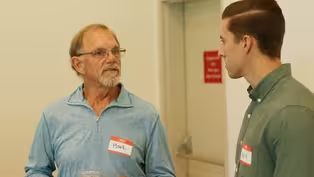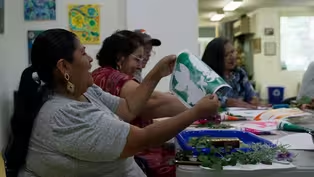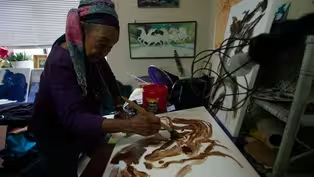
This Program Helps Seniors Live at Home on Their Own Terms
Clip: 2/28/2025 | 7m 54sVideo has Closed Captions
A unique partnership in North Carolina is revolutionizing how seniors can safely age in their homes.
90% of seniors want to stay in their homes as they age, but most houses aren't built for aging bodies. In Guilford County, NC, the Aging Gracefully program is changing that by uniting healthcare providers with home repair specialists. This $5,000 solution helps seniors maintain independence through smart home modifications, saving thousands in long-term care costs.
Problems playing video? | Closed Captioning Feedback
Problems playing video? | Closed Captioning Feedback
ncIMPACT is a local public television program presented by PBS NC

This Program Helps Seniors Live at Home on Their Own Terms
Clip: 2/28/2025 | 7m 54sVideo has Closed Captions
90% of seniors want to stay in their homes as they age, but most houses aren't built for aging bodies. In Guilford County, NC, the Aging Gracefully program is changing that by uniting healthcare providers with home repair specialists. This $5,000 solution helps seniors maintain independence through smart home modifications, saving thousands in long-term care costs.
Problems playing video? | Closed Captioning Feedback
How to Watch ncIMPACT
ncIMPACT is available to stream on pbs.org and the free PBS App, available on iPhone, Apple TV, Android TV, Android smartphones, Amazon Fire TV, Amazon Fire Tablet, Roku, Samsung Smart TV, and Vizio.
Providing Support for PBS.org
Learn Moreabout PBS online sponsorship- America is aging.
By 2030, all Baby Boomers will be 65 or older, marking a significant demographic shift.
And nearly 90% of seniors today wanna stay in their own homes as they age.
It's a concept known as aging in place.
But most homes aren't designed for aging bodies, steep stairs, high cabinets, and slippery bathrooms can create hazards.
It's estimated that about 10% of American homes are not considered aging ready.
And many seniors simply can't afford to make these costly home modifications.
It forces them to make a tough choice between safety and the comfort of their own homes.
So, a lot of memories here?
- Oh, beautiful memories.
Beautiful.
- But what if they didn't have to choose?
What if we could make homes safer right where they are?
I'm David Hurst.
This is "ncIMPACT."
[upbeat music] [gentle music] [birds chirping] Cornelia Powers has lived in her Greensboro home for 68 years.
So this is your family home.
- Family home, yes.
- What does this home mean to you?
- Everything.
I love this home.
- [David] The family wall in her living room tells the story of generations who have called this place home.
- We had all kinds of gatherings.
My mother was the best cook in the world, and my father was very family-orientated, so we had a good time.
- [David] But as Cornelia aged, daily tasks became challenging, sometimes even dangerous.
It was a chore getting in and out of the shower.
She couldn't reach her washer and dryer and had to get on her tiptoes to get clothes out.
And after being diagnosed with emphysema, these everyday challenges became more than inconvenient.
They became a threat to her breathing.
- That it's here, that it is for me, the better I can breathe.
- [David] Cornelia's story is not unique.
It's playing out across North Carolina where the elderly population is projected to nearly double over the next 20 years.
That means for many seniors, the choice becomes stark.
They can risk their safety in an unsuitable home.
They can go somewhere else and leave behind decades of memories, or pay for expensive home renovations.
But like many seniors on fixed incomes, Cornelia couldn't afford costly home repairs and moving out to live with family or a long-term care facility, in her words, was not an option.
[gentle music] But then she heard about a program that could help, one that brings together an unlikely partnership of healthcare workers and home repair specialists.
It's called Aging Gracefully, and it helps seniors age in place.
Instead of treating home safety as just a construction project, it starts with healthcare.
- One of your goals you have is to make it safer and easier.
- [David] Occupational therapists like Beth and nurses, like Amanda, visit seniors in their homes, assessing their needs through a medical lens.
- We figure out with their functional mobility, their basic daily activities and then advanced activities like bill paying and doing laundry, what activities they feel like they are not as safe with or would like to be more independent with.
- [David] Once these healthcare professionals identify what needs to be done, they write prescriptions in the form of home modifications.
Then, another local nonprofit called Community Housing Solutions steps in to make these improvements.
We're talking about things like adding access ramps, installing grab bars, and raising toilet seats.
- I like to say this program is the intersection of healthcare and housing, where we take the strengths of two fields of study and put 'em together and the outcomes are phenomenal.
- [David] And it doesn't stop at home improvements.
The healthcare team makes regular visits, monitoring how seniors adapt to their modified homes.
- It's making sure that nobody is left behind.
It's making sure that everyone has the opportunity to live at home for as long as possible, to achieve the most optimal health outcomes that they can, and ultimately, not have to spend time in the hospital, not have to experience depression, not have to experience fear being in the home, but we want to equip people to live confidently and boldly at home.
- So, David, this is in our warehouse, this is our operations central or command control- - Okay.
- Where we do all of our planning for the work that we do out in the field.
- [David] Inside Community Housing Solutions command center, the whiteboards track dozens of ongoing renovation projects.
- You'll also notice the AG on the addresses.
Those are Aging Gracefully homeowners.
So of the 13 addresses we have right there, six of them are Aging Gracefully home repairs that we're currently involved with.
- Is that common?
Is that usually how many there are going on in a week?
- It can vary depending on, as we get the flow of the work write-ups from the occupational therapists, we do about 150 home repairs a year.
So about a third of them are Aging Gracefully.
- It drives home the need for a command center to keep it all organized, right?
- [Gene] Exactly, exactly.
Yep.
- [David] But as I toured the facility, I kept thinking about a question.
With labor and material costs soaring and an aging population that keeps growing, how sustainable really is this approach?
But I was surprised to learn that programs like Aging Gracefully might actually save money in the long run.
So let's break down the numbers.
An Aging Gracefully home modification typically costs about $5,000.
Seems expensive, right?
Well, not when you compare it to the alternatives.
One emergency room visit after a fall, including rehab and medications, costs about $30,000.
But what if they just went into a care facility instead of staying in their home?
Well, a year in a North Carolina Medicaid nursing home runs about $90,000.
- So by doing this $5,000 investment, we can prevent falls and those costs, but we can also hopefully allow them to live longer in their home and prevent them from having to go into a nursing home, which is $90,000 a year.
- [David] And Guilford County isn't alone in recognizing these savings.
Across North Carolina, the Housing Finance Agency is partnering with local governments and nonprofits to provide financing for home repairs and modifications, specifically targeting low-income seniors.
But I've got another question.
What if we're approaching this from the wrong end?
Why retrofit homes when we could build them better from the start?
Well, there's a growing movement in home construction called universal design, building Homes that work for everyone from the beginning.
Wide doorways, single-story layouts, lower countertops, features that make sense for all ages and abilities.
But despite growing awareness, most new homes aren't built this way.
Without enough market demand, builders stick to the more traditional designs.
But some cities are taking action.
San Antonio, for example, now requires all new homes built with city funding to follow universal design principles.
But until more of these types of building codes are in place, or there's more market demand for universal design, programs like Aging Gracefully can bridge the gap.
Today, Cornelia's home works for her, not against her.
A walk-in shower replaced the dangerous bathtub, new grab bars provide stability, and a stackable washer and dryer means no more tiptoeing to reach clothes.
Each modification helping her stay in the home she loves.
- The best thing that can happen is to get someone that advocates for your better life.
- Well, thank you for inviting us into your home.
Maybe next time I visit, Amanda and Beth will be up here on the family wall.
[all laughing] - Thank y'all for coming.
It's been fantastic.
For "ncIMPACT," I'm David Hurst.
Inside North Carolina’s $10 Billion Unpaid Caregiving Crisis
Video has Closed Captions
Clip: 2/28/2025 | 6m 49s | See the stories and solutions behind the growing dementia care crisis. (6m 49s)
Video has Closed Captions
Preview: 2/28/2025 | 20s | As senior populations soar, a new generation designs innovative solutions for elder care statewide. (20s)
The Surprising Cure for America's Loneliness Crisis
Video has Closed Captions
Clip: 2/28/2025 | 6m 50s | Doctors and artists team up to fight senior isolation through a novel healthcare approach. (6m 50s)
Providing Support for PBS.org
Learn Moreabout PBS online sponsorship
- News and Public Affairs

Top journalists deliver compelling original analysis of the hour's headlines.

- News and Public Affairs

FRONTLINE is investigative journalism that questions, explains and changes our world.












Support for PBS provided by:
ncIMPACT is a local public television program presented by PBS NC


